Edward Kelly
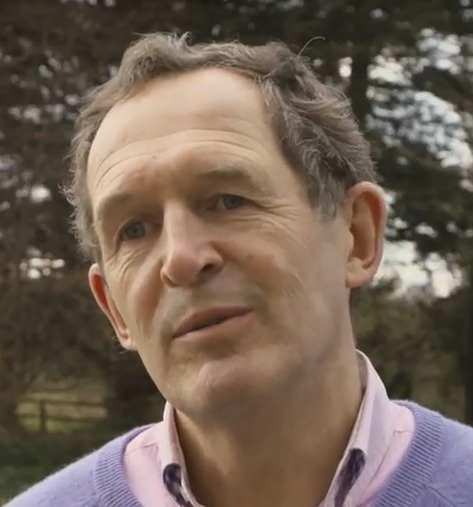
Edward J Kelly
According to this model of adult development, less than 10% of our leaders have the developmental capacity to match the complexity of the issues they face, and that includes President Donald Trump and Prime Minister Theresa May. This mismatch, which gets resolved at the next stage in our or their development, looks more like statesmanship than leadership.
How much better off would we be to have statesmanship as our model of good leadership, rather than the more conventional, pragmatic and management orientated definition we have now? Such a more mature definition would start by asking, what is our vision and what contribution do we want to make, in its broadest sense? Vision for an organisation or a society is what intention is for us. It addresses the ‘why’ question; why are we doing what we are doing? Strategy comes next.
What structure or plan do we have to translate that vision into a reality? Then comes the implementation, the actual doing of what is required. Finally, there is the ongoing feedback, which tells us, whether we need to change what we are doing (single-loop), what and how we are doing it (double-loop) or what, how and why we are doing it (triple loop). More ethical, responsible, grown-up ‘statesmanship as leadership’ quite naturally integrates these four territories of experience (vision, strategy, implementation and feedback). Conventional leadership misses two of these; it confuses a strategy for a vision and responds to feedback by ‘doubling up’, we’ll go on as we were because we said we would. Statesmanship transcends the doing to which it adds a vision to underpin it and an ongoing inquiry to ensure it remains on track.
In so many respects, it has never been a better time in history to be alive. Modernity has made us healthier, wealthier and living much longer. Modernity’s gains however, have come at a cost. New issues have arisen that are global in origin and systemic in nature; globalisation, global climate change, global population expansion, global migration, human longevity, the threat of nuclear war, the disruptive impact of biotechnology and artificial intelligence and the absence of effective global governanceiii. None of these issues can be solved by nation states alone nor can they be fully appreciated from anything less than an Interdependent level of consciousness. Earlier stages simply don’t get the interconnectedness of these things or if they do, they can’t help but reduce them to their current level of consciousness. This doesn’t show up in a lack of comprehension of the issues, but does show up in a lack of capacity to act in respect of them. Issues that are global and systemic in nature get reduced to what is local and personal and then we wonder why things aren’t working out so well?
Unpalatable as it may seem, out of 18,000 surveys of leaders/managers/consultants in Europe and America over the past few decades, 34% profile at a Dependent level of consciousness (associated with Reactionary leadership), 56% at an Independent level of consciousness (associated with Pragmatic conventional leadership) and less than 10% at an Interdependent level of consciousness (associated with Transformative leadership). Why is this such a problem? Because the big issues we are facing are manifesting at a level of complexity beyond the capacity of our traditional and conventional leaders to respond. We experience this as a leadership crisis, but really it is a development crisis. Too many leaders in positions of power and influence are reducing complex interconnected issues to conventional pragmatic solutions when clearly more radical and transformative solutions are required (see figure 1).
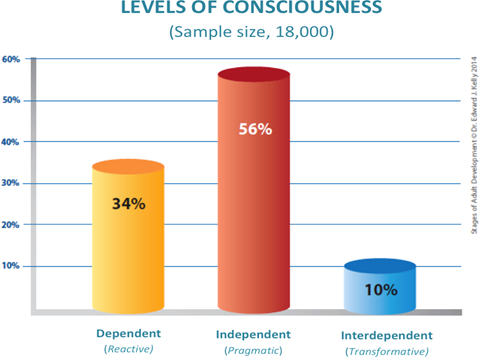
Figure 1 Survey Results
Reactive, Pragmatic & Transformative Leadership
Stepping back a bit, what makes a leader’s actions more Reactive, Pragmatic or Transformative? According to Adult Development Theoryiii there is a qualitative difference in mindset or worldview of someone operating from a Dependent, Independent or Interdependent level of consciousness. Our consciousness is ordinarily defined as our awareness or perception of something. “I wasn’t conscious of that”, we say, by which we mean there was something going on in reality that we weren’t aware of. In that admission, we recognise the separation between us as the perceiver and what is being perceived. The perceived could be another person, event or situation outside of us, or an experience we are having internally or indeed some mix of both. Either way there is the ‘who’ that is doing the perceiving, which is us (our personality, background, knowledge, skill and experience), there is the ‘how’ we are perceiving it, our level of consciousness (i.e., the frame or tunnel through which we make meaning of it) and then there is the ‘what’ is being perceived, the experience itself (the event, situation or context we find ourselves in). Each of these is influencing the other, but they are also different. In looking through a developmental lens, we are focusing on the ‘how’, the frame or tunnel through which we make meaning of experience which in turn allows us to explore; ‘how do we make sense or meaning of our experience (our consciousness), how does that evolve over time (our level of consciousness) and what impact does it have on our behaviour (our actions, on what we say and do)’?
According to this theory of adult development, there are seven possible stages in our development as adults with each successive one offering us a more expanded view of reality. For ease of use, these seven stages are reduced to three main levels of consciousness; Dependent (also known as a traditional level of consciousness), Independent (a conventional level of consciousness) and Interdependent (a post-conventional level of consciousness) (see table 1). What are the main differences? Very simply, a Dependent level of consciousness is mostly concerned with itself, an Independent level of consciousness with itself and others (our tribe, culture or society), an interdependent level of consciousness is concerned with itself, others and all of us (including the wider context and environment we share). Coming to an awareness of what level of consciousness we ordinarily operate from requires our ongoing observation and introspection. Models and methods of inquiry, such as the four-parameter development model used here, can be of assistance. The central questions are;
- What ‘perspective(s)’ is/are motivating our actions? Are they coming from a subjective, objective or integrated perspective?
- What awareness of ‘time’ is evident in our actions? Is there no awareness of time, a limited awareness of time (past and future) or a more integrated awareness of time (past, present, and future)?
- How open are we to ‘feedback’ in our actions? Not open to feedback, open to feedback from others, or open to feedback from ourselves, others and the world around them (single, double or triple-loop)?
- What does our action say about how we use our ‘power’ and influence? Is it a more unilateral use of power, bilateral or mutually transforming? (See table 1).
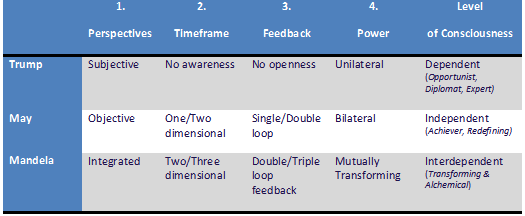
Table 1
When this model is applied in leadership seminars, participants easily align the four capacities in a leader’s actions (perspectives, timeframe, feedback, and power) to their stage of development. This in turn enables them to see how their level of consciousness is showing up in their behaviour and whether it is more Reactive, Pragmatic or Transformative. Reactive leadership for instance operates from a Dependent level of consciousness (known by the stages Opportunist, Diplomat and Expert, see Appendix 1) and has a ‘capacity’ for perspective-taking that is subjective, a timeframe that is immediate, where there is no obvious openness to feedback and that uses its power and influence unilaterally. Pragmatic leadership operates from an Independent level of consciousness (known by the stages Achiever and Redefining) and has a ‘capacity’ for perspective-taking that is pragmatic, a timeframe that is two-dimensional, an openness to feedback that extends to others and the world around them and that uses its power and influence bilaterally. Transformative leadership operates from an Interdependent level of consciousness (known by the stages Transforming and Alchemical) and has a ‘capacity’ for perspective taking that is integrated, a timeframe that is three dimensional, an openness to feedback to oneself, others and the world around them (triple-loop) and a use of power and influence that is mutually transforming, of oneself, others and situation one finds oneself in. The model is also illustrated in figure 2 following.
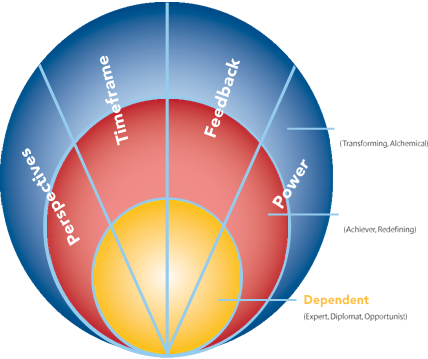
Four Development Variables over Three Levels of Consciousness
Trump, May & Mandela
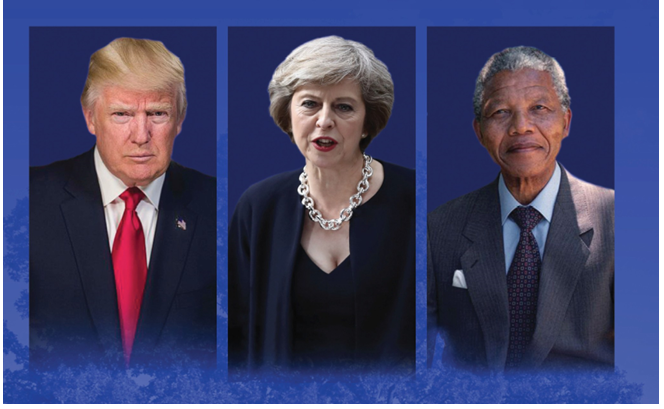
Trump, May, Mandela
Applying this four-parameter model of development to the leadership behaviour of Donald Trump, Theresa May and Nelson Mandela, is one operating from a Dependent level of consciousness, another from an Independent level and still another from an Interdependent level or put another way, is one more Reactive, another more Pragmatic and still another more Transformative? At least according to the model, it is clear that Trump is operating from a Dependent or traditional level of consciousness which is associated with Reactive Leadership, May from an Independent or conventional level of consciousness associated with Pragmatic Leadership and Mandela from an Interdependent or post-conventional level of consciousness associated with Transformative Leadership. These are not however behavioural choices as their behaviour is emanating from the sense or meaning they ascribe to their experience and that in turn becomes the frame or tunnel through which their experience of reality is being processed. We or they might intellectually want to operate from a later stage of development, from say an Interdependent level of consciousness, but then in-action and under pressure, we and they automatically revert to whatever level of consciousness we/they ordinarily operate from.
With Donald Trump, for example, he has said, “I will build a great wall and I will make Mexico pay for that wall. Mark my words”. In this example, he exhibits a ‘capacity’ for perspective taking that is subjective, a timeframe that is immediate, no obvious openness to feedback and a use of power that is unilateral. This is consistent with someone who is framing their meaning from a Dependent level of consciousness (Opportunist, Diplomat, Expert), which underpins Reactive leadership.
With Theresa May she has said, “I do want us to have a customs agreement with the EU. Whether that means we must reach a completely new customs agreement, become an associate member of the customers union in some way, or remain a signatory to some elements of it, I hold no preconceived position”. May’s actions indicate a capacity for perspective taking that is objective, a timeframe that is two-dimensional, an openness to feedback that extends to others and the world around her and a use of power and influence that is bilateral. This is consistent with someone who is framing their meaning from an Independent level of consciousness (Achiever, Redefining), which in turn is associated with Pragmatic conventional leadership.
With Nelson Mandela he has said, “Resentment is like drinking poison and then hoping it will kill your enemies”. In Mandela’s case, he illustrates a capacity for perspective taking that is integrated, a timeframe that is three dimensional, an openness to feedback from himself, others and the world around him (triple-loop) and a use of power that is mutually transforming, of himself, others and situation he finds himself in. This is consistent with someone who is framing their meaning from an Interdependent level of consciousness (Transforming, Alchemical), which in turn is associated with Transformative leadership.
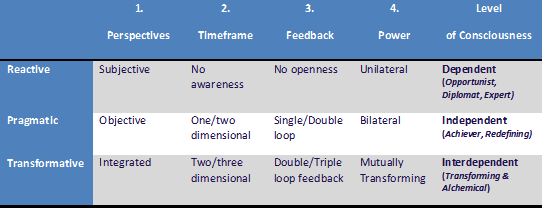
Table 2
Not sure Trump’s actions align with Reactive leadership? In a recent Axios report, Trump displays his disdain for forward planning. Apparently inspired by Mike Tyson who liked to say, “everybody has a plan until they get punched in the nose”, Trump added “we’ve just gotta fight every day and that’s how we will win. We can plan all this stuff but it’ll change. So let’s not go through the effort”[1] By his own description he is reactionary. He has no particular vision for his Presidency, no strategy or timeframe within which to implement it and no consistent definition of what success is, “we’ve just gotta fight every day and that’s how we will win”. Developmentally, a reactive mindset is primed for action but in not being able to listen to others, and in overrating facts that it already agrees with, it places an unsustainable burden on its own reactions. This also makes such leaders very difficult to work with, reflected in Trump’s case by the very high number of resignations or firings during his short presidency. It doesn’t however mean that reactive leaders lack leadership competency, i.e., skills, knowledge, experience and ability to communicate with others, it just means their level of consciousness is limiting their capacity to see and experience more of what is actually going on in themselves, others and the world around them, particularly in themselves.
Not sure that May’s actions align with Pragmatic conventional leadership? Writing in the Sunday Telegraph newspaper1, over two and a half years into the Bexit negotiations, May said that when she returns to Brussels, she will be “battling for Britain and Northern Ireland” and will seek a “pragmatic solution that delivers the Brexit that people voted for while ensuring there is no hard border between Northern Ireland and the Republic of Ireland”. Putting aside the “battling for Britain” language and whether it is necessary to use such confrontational terms with her EU ‘partners’, the fact that the majority of people in Northern Ireland voted to remain in the EU and whether the voters in the rest of UK were really all that clear about what Brexit they were voting for, May is by her own admission a pragmatist. Developmentally, a pragmatic mindset thrives in a conventional and ordered world but is much less comfortable in a rapidly changing one. Its strengths include; a strong sense of responsibility, a clear commitment to achieving an end result and a willingness to work with others to get things done. Its weaknesses, however, are that it fails to see how much of the objective world is created from its own internal map. In May’s case, she doesn’t have an vision for Brexit or at least not one that is her own. Recall that she voted to remain in the EU. What she has is a strategy, her red lines, which is no substitute for a vision. Having a vision enables us to truthfully answer the ‘why’ question, why are we doing what we are doing? Strategy comes after and focuses on the ‘what’ and ‘how’ questions, how are we going to implement this vision? When there is a discordance between these two, vision and strategy, as appears to be the case in May’s situation, more strategy won’t solve the problem.
Not sure that Mandela’s actions align with transformative leadership? The example often given of Mandela’s transformative leadership is the 1995 Rugby World Cup Final in South Africa. Mandela, as President, called on all South Africans to support the national team. With few exceptions however, rugby was played by the minority white population in South Africa. The majority non-white population didn’t consider the rugby team to be ‘their national team’ at all. Risking the support of his followers and everything that he and they had fought for, Mandela single- handedly raised the bar for all around him. There are few more memorable moments in sport, so well captured in the film Invictus, than that of Mandela, wearing a South African Springbok jersey, handing the World Cup to Francois Pienaar, the Captain of the winning South African rugby team. In his actions, Mandela helped to unite the most divided of nations and provided a vision of hope for the future. He also demonstrated one of the most important aspects of Transformative leadership and that is a capacity to turn up in the present, free from past attachments and future projections, and respond to what is arising.
Warren Buffett and Jacinda Ardern
Conventional leaders may wonder whether all this inquiry and self-awareness is really necessary. Are there examples for instance of well-known business leaders or current political leaders who have developed themselves to an Interdependent level? Warren Buffett is one such example. In Buffet’s case, there have been three major transformations in his career from Buffett the investor in the early years to Buffett the business leader in the mid-years to Buffett the elder statesman in more recent years. In each period, Buffett exhibits a very different kind of leadership behaviour; more Reactive in the Buffett the investor period, more Pragmatic in the Buffett the business leader period and more Transformative in the Buffett the elder statesman period. Each of these periods in his career are underpinned by a different level of consciousness; a Dependent level in the Buffett the investor period, an Independent level in Buffett the business leader period and an Interdependent level in Buffett the elder statesman period. Each of these in turn transcend and include the other so that Buffett is no less an investor because he became a business leader and no less an investor and business leader because he later became an elder statesman. It doesn’t, however, work the other way around. The ‘capacities’ that Buffett developed as a leader/elder at the later stages were not available to him at the earlier stages. He was clearly the same person, with the same intelligence and temperament, but he hadn’t developed himself to the point where his leadership was Transformative or would qualify for our definition of statesmanship.
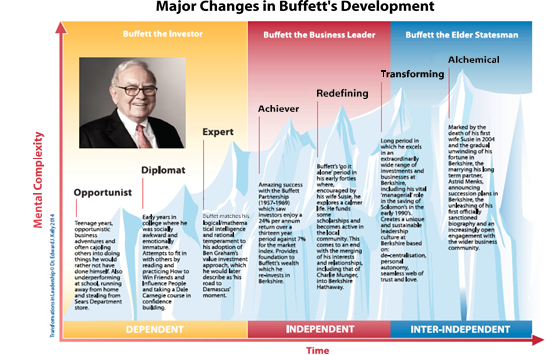
Figure 3. Warren Buffett: Three Major Transformations
Crucially this kind of statesmanship is not determined by age alone. Age increases the chances that we will expand our consciousness, but it is no guarantee of it. Jacinda Ardern, for instance, New Zealand’s Prime Minister, is only 38 years old and yet she has recently shown more statesmanlike leadership than many of her much older international colleagues. Her capacity to empathise rather than just sympathise with the Muslim community, to bring the rest of society with her as she took on gun control, so long seen in other countries as being too difficult to regulate, has inspired the world. Her Transformative leadership stands in stark contrast to the defensive and Pragmatic leadership of Therese May and the Reactive and incendiary leadership of Donald Trump. The difference is not one of personality or context though; it is one of development. Statesmanlike leaders like Jacinda Ardern, Warren Buffett and Nelson Mandela see and experience more of reality, in themselves, others and the world around them and are therefore more likely to lead in a timely, effective and sustainable manner.
The Elders and Buurtzorg
Also, it’s not just individuals that can operate from a more expanded level of consciousness or awareness, organisations can too. For instance The Elders Climate Action group, a non-partisan movement of Elders in the US committed to changing national policy on climate, the B Team, a not-for-profit alliance of business leaders committed to helping the private sector redefine its responsibilities in the face of Climate Change and The Elders, a global network of experienced leaders set up by Nelson Mandela in 2007, are all exhibiting statesmanlike leadership in their actions. Take The Elders network, for instance, currently chaired by Mary Robinson. Their vision is for
a world where people live in peace, conscious of their common humanity and their shared responsibilities for each other, for the planet and for future generations.
We don’t need to apply the four parameters of the development model to tell us how inclusive this kind of leadership will be, but if we did, we could see that their perspective-taking is integrated, their timeframe is multigenerational (three dimensional), their openness to feedback includes themselves, others and the world around them (triple-loop) and their use of power and influence is designed to be mutually transforming, of themselves, others and the situation they find themselves in, consistent that is, with an organisation framing its meaning from an Interdependent level of consciousness.
Another example is Buurtzorg, which stands for humanity above bureaucracy, an organisation that has transformed home care services in Holland. Started in 2006 by Jos de Blok and three others, Buurtzorg now employs 10,000 people. As described in an influential book by Frederick Laloux called Reinventing Organizations: A Guide to Creating Organizations Inspired by the Next Stage of Human Consciousness, their transformation has come from applying a new kind of organisational design that mimics how living systems work in nature. The technical term is autopoiesis, which refers to a system that is capable of replicating and maintaining itself. Such a system doesn’t need a top-down leadership model as the people doing the work are in charge. As a challenge to conventional management theories of leadership, Buurtzorg has 10,000 employees and no managers.
Leadership in Buurtzorg is a concept, rather than a role, and is embedded in the structure of the organisational design itself. Everyone is a leader. How could that work? Well, by conventional measures it works very well; they are more profitable than their peer organisations, have a lower running cost, have higher client satisfaction and were voted the best place to work in Holland for five years in a row.
In Summary
When we look through a developmental lens, such as the four-parameter development model used here, we gain new insights into how we are making sense or meaning of our experience (our consciousness), how that can evolve over time (our different levels of consciousness) and what impact our level of consciousness has on our behaviour. Using the model we engage in a first-person inquiry where we are the subject of our own research. Applied to others, such as Trump, May and Mandela, it shows that Trump is ordinarily operating from a Dependent (traditional) level of consciousness, Therese May from an Independent (conventional) level of consciousness and Nelson Mandela and others, Warren Buffett, Jacinda Ardern, Mary Robinson and Jos de Blok, from a Interdependent (post-conventional) level of consciousness. These different levels of consciousness in turn show up in the more Reactive behaviour of Donald Trump, the more Pragmatic behaviour of Therese May and the more Transformative behaviour of Nelson Mandela, Warren Buffett, Jacinda Ardern, Mary Robinson and Jos de Blok. It is clear from this inquiry how much our internal level of consciousness impacts our external behaviour.
How likely is it that we will expand our level of consciousness our awareness over time? Despite an overarching evolutionary drive to expand our consciousness or awareness, there is no guarantee it will occur and no time limit within which it may happen. Each stage in our development is experienced through its own ego-tunnel and its attachment to a set of underlying beliefs, attitudes, assumptions and self-images, which like old friends, we are loath to give up and which unlike old friends we may not even be aware of. Kegan & Lahey (2009) describe this as an immunity to change where even in the face of our desire to change, our immunity fights against us. Rather perversely, it even thinks it is doing us a favour, i.e., protecting us. Most adults nonetheless make the transition from a Dependent (traditional) level of consciousness to an Independent (conventional) one, particularly where the wider culture and society is supportive. Far few adults make the later transition from an Independent (conventional) to Interdependent (post-conventional) level of consciousness, which is much harder and harder still because the wider culture and society is much less supportive. What does that mean anyway it wonders? It is however at this Interdependent or post-conventional level of consciousness that we begin to loose our sense of separateness and gain an experience of our true nature as interconnected beings.
While we may not ordinarily know what an Interdependent or post-conventional level of consciousness looks like though, we do know what it feels like to be in the presence of statesmanlike leadership. We instantly recognise the capacity for self-awareness on the part of the leader, that greater sense of connectedness with others and the obvious willingness to pursue outcomes that are beyond the personal ambition of the leader or the group they represent. Using this model we can identify such leaders by their relative capacity for perspective taking, awareness of time, openness to feedback and use of power. This doesn’t deny the importance of the leader’s personality, background, knowledge, skills and experience or the impact of the event, situation or context they find themselves in. It’s more to say that there is another internal process going that is not related to the leader’s personality or circumstances that has responsibility for determining ‘how’ the leader makes sense or meaning of their experience, internally and externally.
How necessary is it that we try and develop this kind of statesmanship like leadership? Given the unprecedented and complex nature of the global issues that leadership faces, and the equally complex social and organisational life that many of us are experiencing, was there ever a time when we were more in need of this kind of grown up, selfless, statesman-like leadership and less in need of the more conventional, pragmatic and management orientated leadership that we are currently subject too? This is what is being missed in leadership; we are all equal, we are just not all equally evolved. More evolved leaders literally see more of what is going on in reality, in themselves, others and the world around them and are therefore better placed to make more consciousness, timely and sustainable decisions that benefit all of us. So next time you see your leaders grappling with a complex issue, apply this simple model and ask yourself, what level of consciousness are they operating from and how is that impacting their actions? Then apply it yourself.
My particular thanks to Mary Kelly-Borgatta, Grady McGonigal, Grattan Donnelly, Dr. Susanne Cook-Greuter, William Torbert, Harrie Bannon, Mary Stacey, Nick Owen and Barry O’Brien for their comments on this article.
Appendix 1
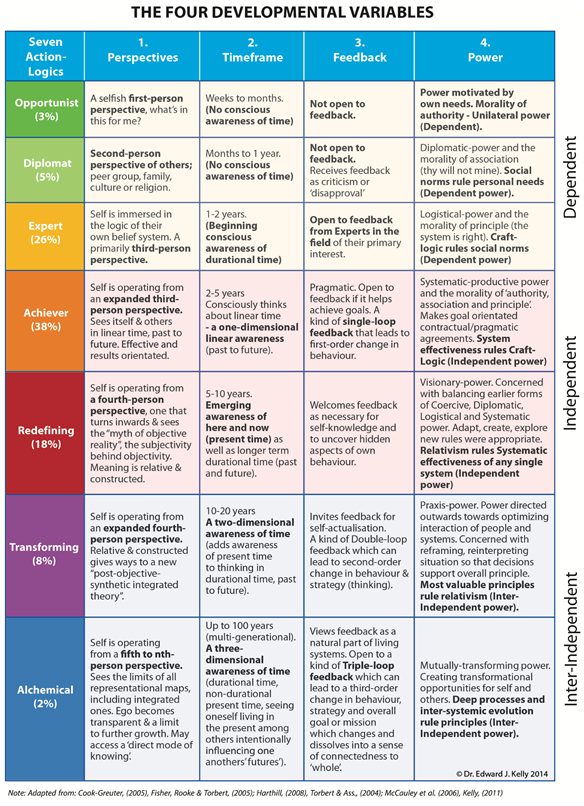
References
1 Sunday Telegraph, 3/02/2019
ii There are many sources for these observations about the complexity of the world we currently live
ii Does climate change care that we have borders between countries? Will the internet cloud wait for 195 countries to decide on what access their citizens should have? Does biotechnology concern itself with the ethical issues that arise from the fusing of inorganic materials and organic materials in our bodies? Does artificial intelligence care about the millions of jobs and communities that will be affected by robotics? What also of the commercialisation of our personal data and the drive to hack our brains and emotions? Who is thinking about this and taking responsibility for governing it? Of even greater concern, however, is what happens when one or more of these issues come together, the lollapalooza effect, as Charlie Munger calls it? Are we not seeing this already with the rise of reactionary politics in the US, UK and across Europe?
iii Adult development theory, or as it is known in the literature as Constructive Developmental Theory (Kegan, 1980), is a family of development theories that look at how we grow and develop our consciousness as adults. The particular theory that influences my approach is known as Developmental Action Inquiry (Torbert et al, 2004) which outlines seven distinct stages of growth in the self, known as Opportunist, Diplomat, Expert, Achiever, Redefining, Transforming, and Alchemical. The four parameters of each stage perspectives, timeframe, feedback and use of power are described by me in my doctoral research, Kelly (2011).
About the Author
Dr. Edward Kelly is the founder of The Third Act (www.thethirdact.ie). He is also a member of an international network of leadership facilitators known the Action Inquiry Fellowship. If you would like the author or one of his colleagues to conduct a leadership seminar in your organisation, please contact us at edward@thethirdact.ie
